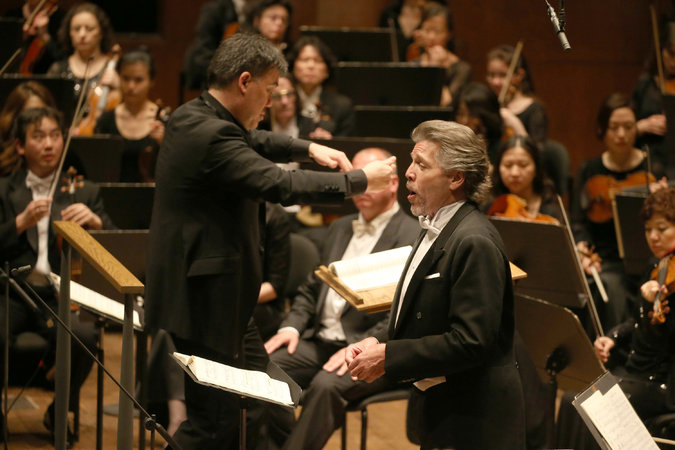A “magnificent” performance of Mahler’s ‘Das Lied von der Erde’ with the NY Phil and Alan Gilbert

“Hampson was at his plain-spoken best, close to conversational, the phrases nearly free, completely transparent to meaning, and clearly involved in all the instrumental passages. His delivery of “Die Welt schlaft ein!” in “Der Abschied” was like centuries of great poetry captured in a single breath.”
George Grella – New York Classical Review
“The soloists here were the busy Wagnerian tenor Stefan Vinke and the distinguished baritone Thomas Hampson, an eminent Mahler singer who was also part of a team of scholars that produced a critical edition Mahler’s songs. . . he [Hampson] made every word matter, shaping lyrical lines with poignancy, conveying the tragic subtext to every youthful effusion in the music. He was magnificent in the final song, “Der Abschied” (“The Farewell”), a half-hour emotional epic, nearly half the entire work, supported with both sensitivity and throbbing intensity by Mr. Gilbert and the inspired players.”
Anthony Tommasini – The New York Times
“Both mezzo-sopranos and baritones have performed the ‘other’ solo role in Das Lied von der Erde . . . Today, it was baritone Thomas Hampson whose strikingly expressive singing moved me and my companion to a tearful state as the work came to an end.
I have admired Thomas Hampson since his Met Auditions win in 1981; among his many Met roles that have particularly impressed me have been: Count Almaviva, Billy Budd, Posa in DON CARLO, Werther, Eugene Onegin, Wolfram in TANNHAUSER, Amfortas, Iago, and – most surprisingly and most recently – Wozzeck. He walked onstage tonight – tall, handsome, and elegant in a tux – with an amiable self-assurance that made me think we were in for something special; Hampson delivered an intensely satisfying performance.
Liang Wang’s oboe solo at the start of “The Solitary One in Autumn” signaled a turn of mood from the boisterous drinking song with which Mr. Vinke had launched the cycle. As Mr. Hampson began to sing of his loneliness and weariness of spirit, his marvelous gift for poetic expression as well as the inherent beauty of his vocal timbre drew me into the music; the external world faded, and the music became the reality.
Midway thru the fourth song, “Of Beauty”, a big dance-like theme erupts, and the baritone seemed ready to dance himself. His singing was characterful and, as the music simmers down, he did some lovely heady effects as well an plunging into basso territory briefly.
It was in the final song, “Farewell”, that Mr. Hampson’s performance put me over the edge. Liang Wang’s oboe and Robert Langevin’s flute establish a wistful mood. The baritone’s thoughtful and sustained singing is beautifully enmeshed in some wonderful playing from the winds; oboe and harp unite; horn, cello, bassoon, and bass clarinet add poignant colours to the canvas. “All longing has become a dream,” sings the poet.
In a spine-tingling moment, Mr. Hampson’s tone adopts a ‘dead’ emptiness, matched by plaintive flute. “I wanted to bid my friend a last farewell!” – how many of us have sadly been deprived of just such an opportunity! Mandolin and celeste are heard, as if from out of a dream of past happiness. “Where are you going, and why must it be?” asks the forlorn friend as the parting draws nigh, and they share the stirrup cup. The song ends with an affirmation of faith in life’s renewal, but even here there’s an illusive feeling. Nature holds sway with the “…luminous blue of distant space…everywhere, forever… forever and ever….”
Alan Gilbert’s baton was suspended in air as the music faded to silence. An ovation of particular warmth ensued, with the maestro, the singers, and the musicians basking in the joy of having shared in a magnificent collaboration.”
“Baritone Thomas Hampson has been a fabulous Mahler interpreter for many years … he still phrases expressively and fully inhabits the German text. The repeated pianissimo words at the very end – “Ewig… Ewig” (Forever”… Forever) – were heart-wrenching. Hampson helped the listeners sense the almost unconsciousness stream of musical waves generated.”
Edward Sava-Segal – Bachtrack
“The second movement featured the second soloist, baritone Thomas Hampson. It is not usual for this work to be performed by the pairing of tenor and baritone, but Mahler himself suggested this as an alternative if an alto was not available. Mr. Hampson brought his dry, slightly woody tone to “The Lonely One in Autumn,” singing with precise control as the orchestra unrolled a gleaming carpet of finely woven notes that fell like leaves in the forest. Delicacy and grace entered the middle movements “Of Youth” and “Of Beauty”, with finely pointed solos in the woodwinds contrasting with Mr. Vinke and Mr. Hampson’s utterances …
The final movement “Der Abscheid” belonged to Mr. Hampson. It is the longest movement here, opening with a sort of death-knell in the lowest woodwind instruments. The voice enters hesitantly, in a recitative that grows with power and confidence as the long-spinning melodies evolved. Here, in the music of deepest yearnings, Mr. Gilbert showed his mettle as a Mahlerian, supporting Mr. Hampson in this long and autumnal movement. As the singer approached the last lines, added by the composer himself, conductor and orchestra provided blissful accompaniment.”
“… baritone Thomas Hampson–a Mahler scholar–brought infinite expressiveness and insight to his work with the Philharmonic … He seemed to inhabit the songs like no one I’ve ever heard; in particular, his version of “Von der Schonheit” (“Of Beauty”) converted me to thinking that only a baritone should sing it, with its reflection on the beauty of young girls (that is, if the baritone is as smart as Hampson).”
Richard Sasanow – Broadway World
Image: Michelle V. Agins/The New York Times